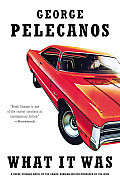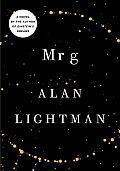Same Old Same Old: Pelecanos, Lightman, Hassman
I've been doing a shit job lately here and have nothing but busyness to blame, plus of course the fact that once a week I'm dumping energy into the Kenyon Blog and not here (latest [about masterful John Leonard's great Reading For My Life] here). Whatever.
I've actually been reading lots, have a stack here of 11 books I've read since the year's start, but we'll see how long it takes to cover each. I'm not making any claims: I just want to get through this stuff in decent time.
 What It Was by George Pelecanos
What It Was by George Pelecanos
This actually might be my favorite Pelecanos novel so far—simply because the threads were so deeply buried I couldn't, by page 120, remember all the plot complications that'd led me through those pages. The cast of characters in What It Was is bigger than anything of his I've read before, and the twists slicker, the sleight-of-hand surer. Weirdly, it feels like a less oomph of a book—less somehow deep-digging as his last two, though I think this book simply feels lighter because 1) it's set in the 1970′s, and 2) the whole book is, the reader understands, a conversation between two dudes at a bar, present-day. One of the guys is telling of his start as a private detective, and the story's about as satisfying a pulpy crime novel as you're likely to read in a good while.
I'll admit to being one of those Einstein's Dreams dorks—I think I've purchased and given away like 5 copies of that thing (it's like The Alchemist but less treacly)—and that therefore I was hugely pumped to read Mr g, which—it says right there on the cover—is a novel about the creation. Yes! Speculative fiction from the great Lightman! People, no: this might be the least compelling novel I've ever read. It's not that it's bad—I don't think Lightman's a bad writer—it's that it's boring, and it's silly, and it's pretentious as hell, pretending to bite off the most compellingly mysterious chunk of life and then playing emptily with it. Read it only for frustration, and hope Lightman's next outing will take him some place much more fruitful than this.
I was hoping to be able to feature an interview with Ms Hassman along with a long review of her book, but she never responded to the questions. I'm gonna go ahead and jump on Megan Mayhew Bergman's review of the book from a few weeks back at the NYTimes, which I thought was thorough and accurate if, of course, slightly shorter than it could/should be. Girlchild is, actually, a fucking great book—the first great book of 2012, for my money. It's not just that Rory Hendrix is an unstoppably entertaining and heart-breaking and vivid character, or that the book's got its share of post-modern trickery (blacked-out passages, sections written by Rory's mother's social-worker), or that the book's balance of startling frankness and incredible fragility should be enough to make anyone real grateful for the book's existence—it's all of those, plus the fact that Hassman's made a novel, a real story. This isn't just some stuffed-together nonsense: the book adds up, and you close the pages feeling changed, weight added to your inside bits. This one's a stunner: I'm amazed the book hasn't gotten much much bigger and more notice—it sure as hell deserves it.









 Mr g by Alan Lightman
Mr g by Alan Lightman Girlchild by Tupelo Hassman
Girlchild by Tupelo Hassman

